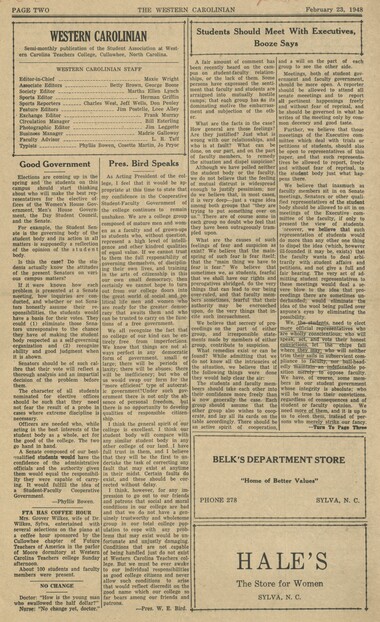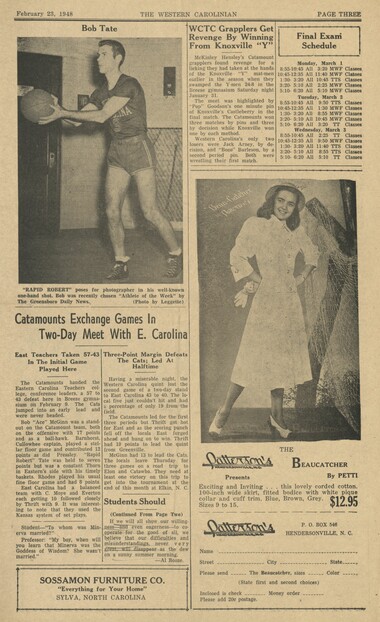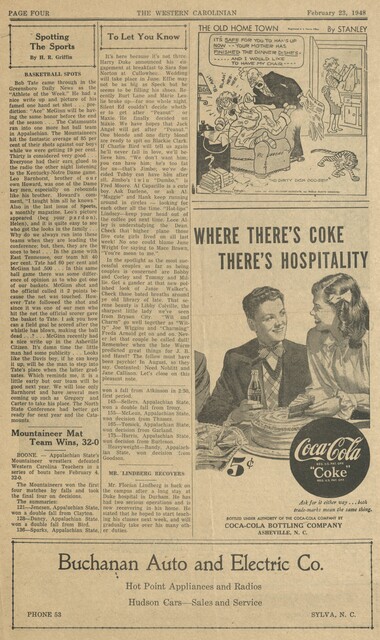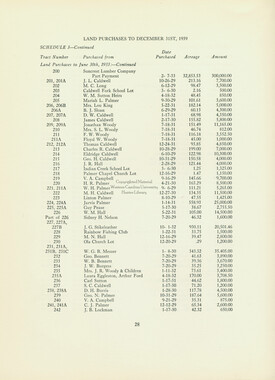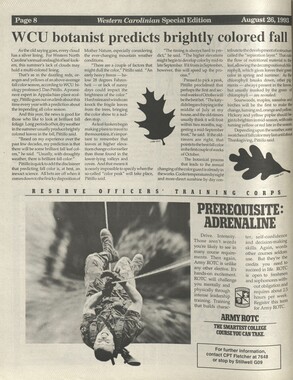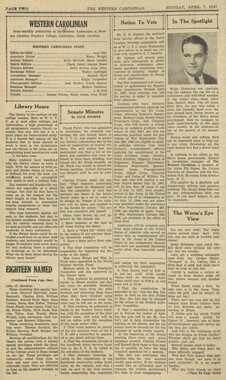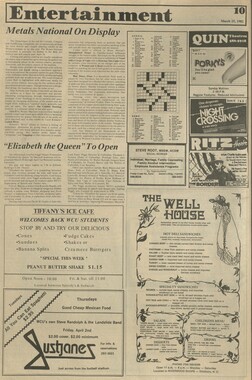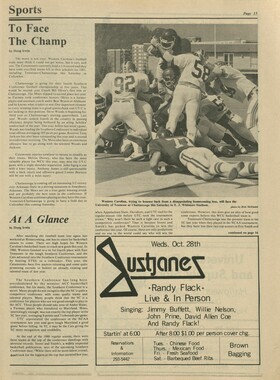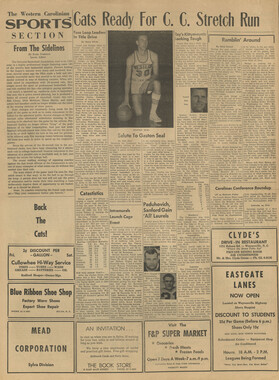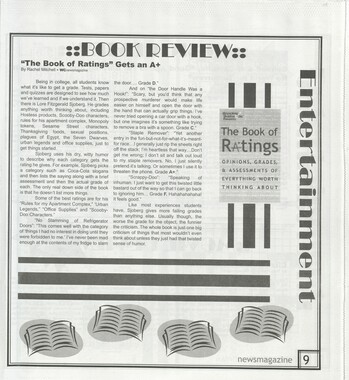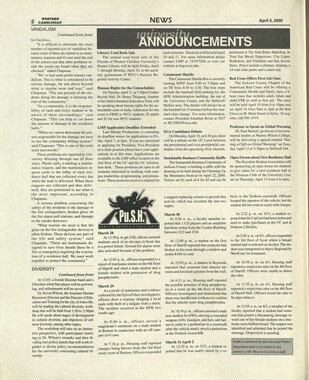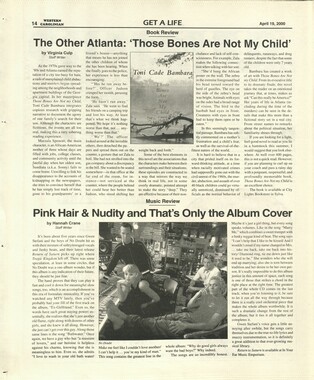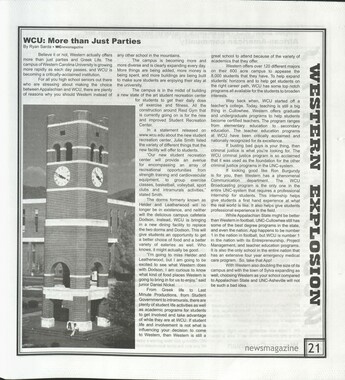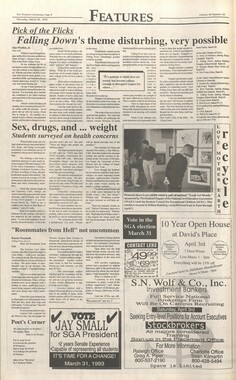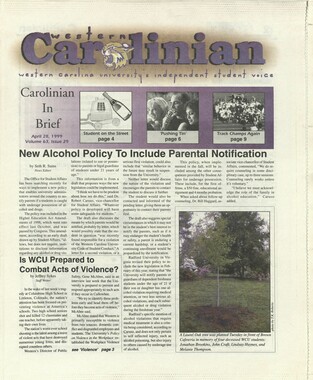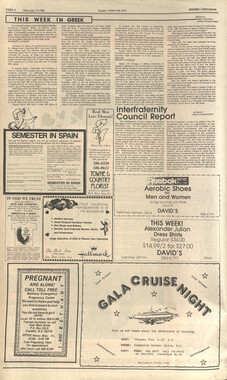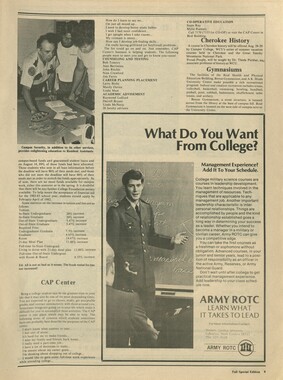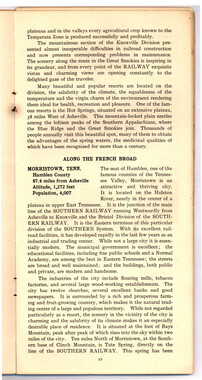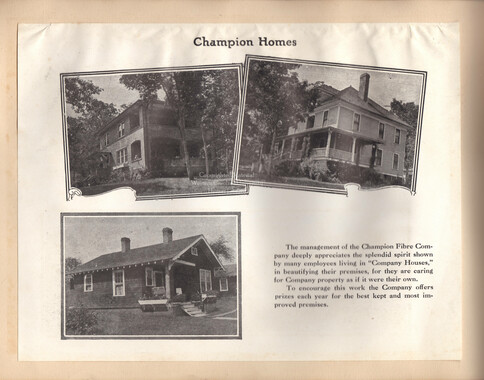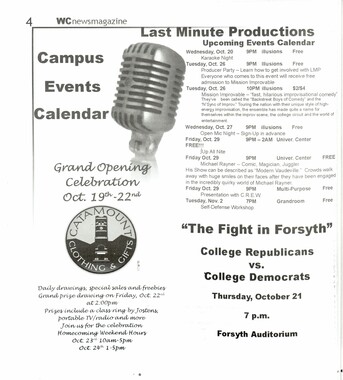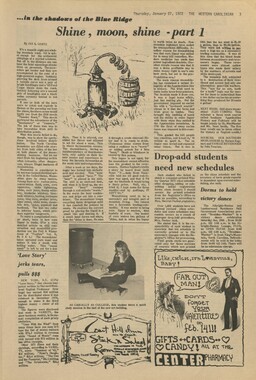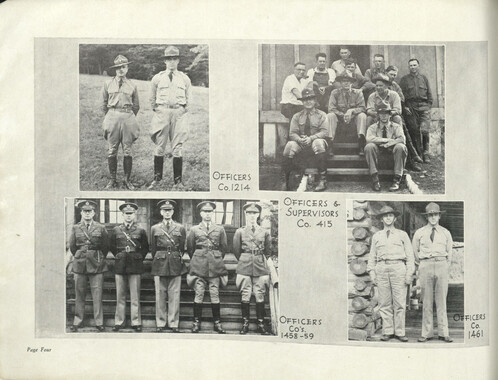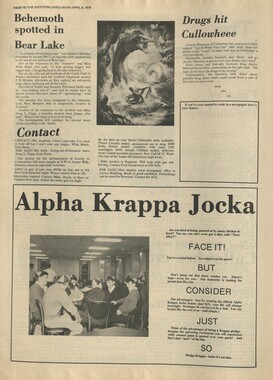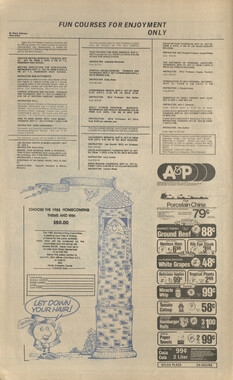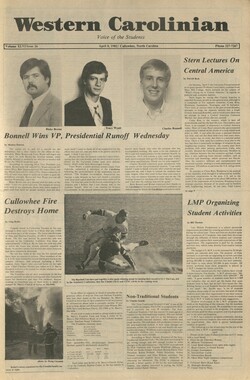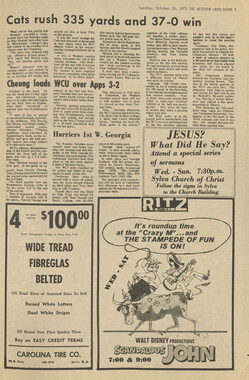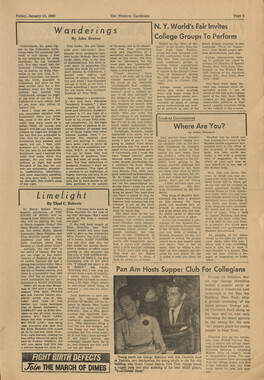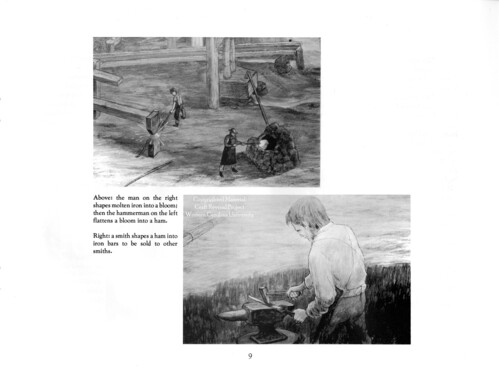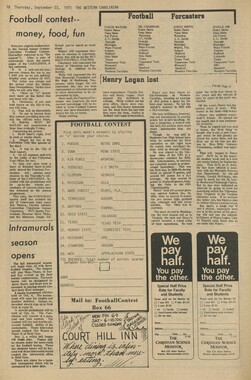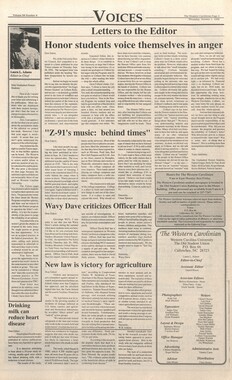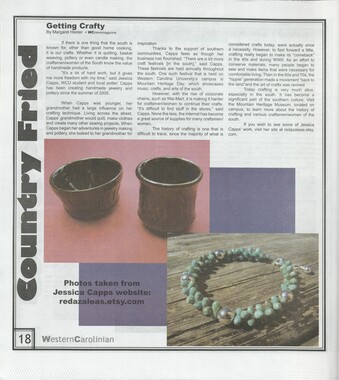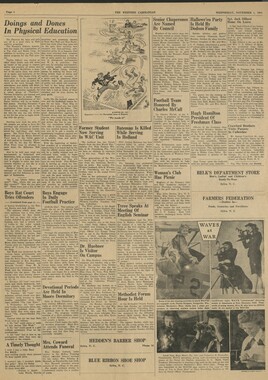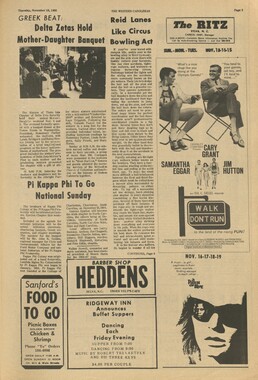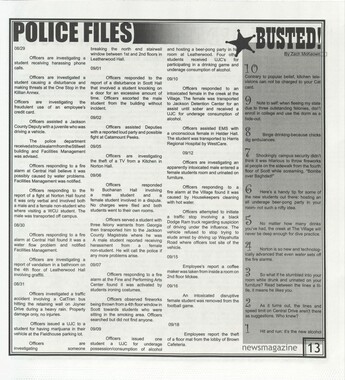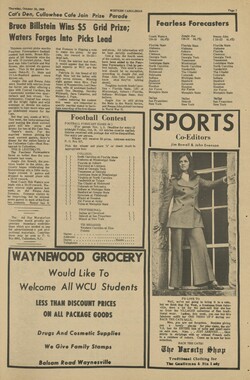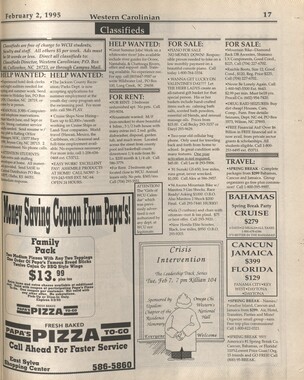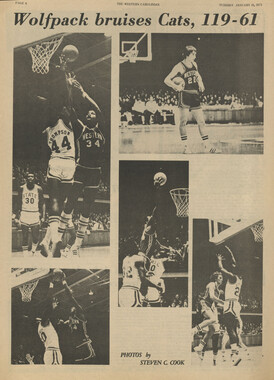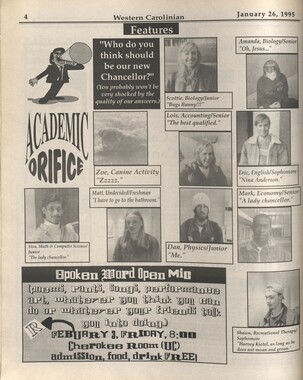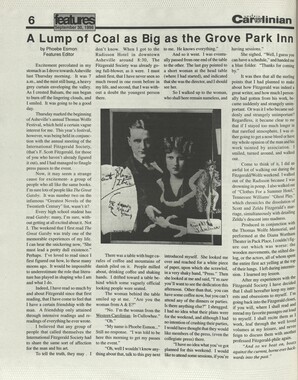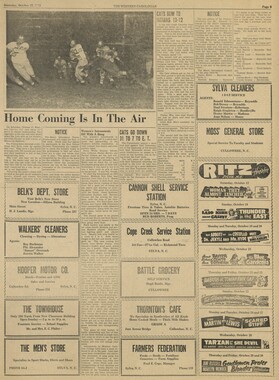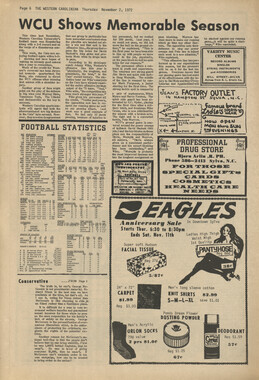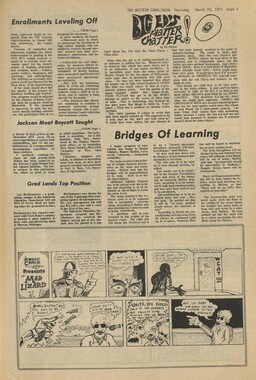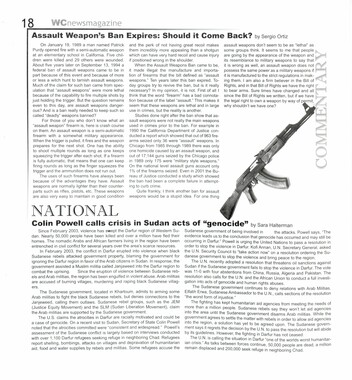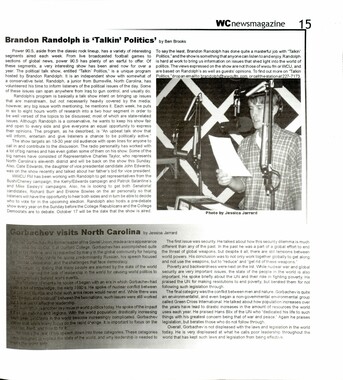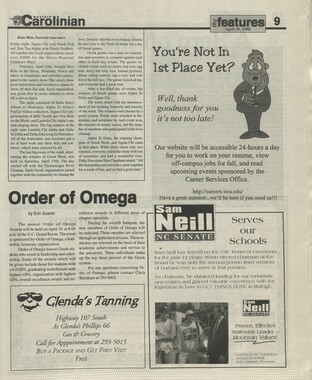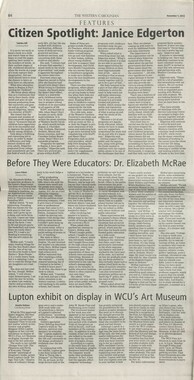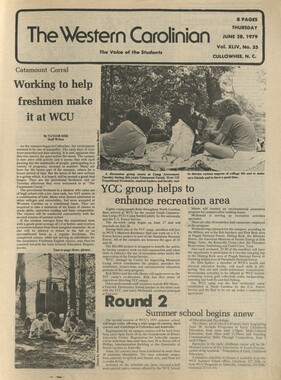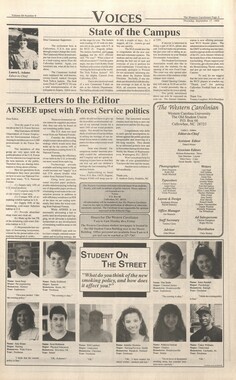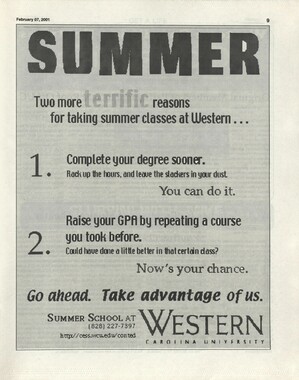Western Carolina University (21)
View all
- Canton Champion Fibre Company (2308)
- Cherokee Traditions (291)
- Civil War in Southern Appalachia (165)
- Craft Revival (1942)
- George Masa Collection (137)
- Great Smoky Mountains - A Park for America (3080)
- Highlights from Western Carolina University (422)
- Horace Kephart (998)
- Journeys Through Jackson (159)
- LGBTQIA+ Archive of Jackson County (89)
- Oral Histories of Western North Carolina (318)
- Picturing Appalachia (6617)
- Stories of Mountain Folk (413)
- Travel Western North Carolina (153)
- Western Carolina University Fine Art Museum Vitreograph Collection (129)
- Western Carolina University Herbarium (92)
- Western Carolina University: Making Memories (738)
- Western Carolina University Publications (2491)
- Western Carolina University Restricted Electronic Theses and Dissertations (146)
- Western North Carolina Regional Maps (71)
- World War II in Southern Appalachia (131)
University of North Carolina Asheville (6)
View all
- Allanstand Cottage Industries (62)
- Appalachian National Park Association (53)
- Bennett, Kelly, 1890-1974 (1463)
- Berry, Walter (76)
- Brasstown Carvers (40)
- Carver, George Washington, 1864?-1943 (26)
- Cathey, Joseph, 1803-1874 (1)
- Champion Fibre Company (233)
- Champion Paper and Fibre Company (297)
- Cherokee Indian Fair Association (16)
- Cherokee Language Program (22)
- Crowe, Amanda (40)
- Edmonston, Thomas Benton, 1842-1907 (7)
- Ensley, A. L. (Abraham Lincoln), 1865-1948 (275)
- Fromer, Irving Rhodes, 1913-1994 (70)
- George Butz (BFS 1907) (46)
- Goodrich, Frances Louisa (120)
- Grant, George Alexander, 1891-1964 (96)
- Heard, Marian Gladys (60)
- Kephart, Calvin, 1883-1969 (15)
- Kephart, Horace, 1862-1931 (313)
- Kephart, Laura, 1862-1954 (91)
- Laney, Gideon Thomas, 1889-1976 (439)
- Masa, George, 1881-1933 (61)
- McElhinney, William Julian, 1896-1953 (44)
- Niggli, Josephina, 1910-1983 (10)
- North Carolina Park Commission (105)
- Osborne, Kezia Stradley (9)
- Owens, Samuel Robert, 1918-1995 (11)
- Penland Weavers and Potters (36)
- Roberts, Vivienne (15)
- Roth, Albert, 1890-1974 (142)
- Schenck, Carl Alwin, 1868-1955 (1)
- Sherrill's Photography Studio (2565)
- Southern Highland Handicraft Guild (127)
- Southern Highlanders, Inc. (71)
- Stalcup, Jesse Bryson (46)
- Stearns, I. K. (213)
- Thompson, James Edward, 1880-1976 (226)
- United States. Indian Arts and Crafts Board (130)
- USFS (683)
- Vance, Zebulon Baird, 1830-1894 (1)
- Weaver, Zebulon, 1872-1948 (58)
- Western Carolina College (230)
- Western Carolina Teachers College (282)
- Western Carolina University (2008)
- Western Carolina University. Mountain Heritage Center (18)
- Whitman, Walt, 1819-1892 (10)
- Wilburn, Hiram Coleman, 1880-1967 (73)
- Williams, Isadora (3)
- Cain, Doreyl Ammons (0)
- Crittenden, Lorraine (0)
- Rhodes, Judy (0)
- Smith, Edward Clark (0)
- Appalachian Region, Southern (3032)
- Asheville (N.C.) (1945)
- Avery County (N.C.) (26)
- Blount County (Tenn.) (195)
- Buncombe County (N.C.) (1680)
- Cherokee County (N.C.) (283)
- Clay County (N.C.) (556)
- Graham County (N.C.) (238)
- Great Smoky Mountains National Park (N.C. and Tenn.) (535)
- Haywood County (N.C.) (3573)
- Henderson County (N.C.) (70)
- Jackson County (N.C.) (4925)
- Knox County (Tenn.) (35)
- Knoxville (Tenn.) (13)
- Lake Santeetlah (N.C.) (10)
- Macon County (N.C.) (421)
- Madison County (N.C.) (216)
- McDowell County (N.C.) (39)
- Mitchell County (N.C.) (135)
- Polk County (N.C.) (35)
- Qualla Boundary (982)
- Rutherford County (N.C.) (78)
- Swain County (N.C.) (2185)
- Transylvania County (N.C.) (270)
- Watauga County (N.C.) (12)
- Waynesville (N.C.) (86)
- Yancey County (N.C.) (72)
- Aerial Photographs (3)
- Aerial Views (60)
- Albums (books) (4)
- Articles (1)
- Artifacts (object Genre) (228)
- Bibliographies (1)
- Biography (general Genre) (2)
- Cards (information Artifacts) (38)
- Clippings (information Artifacts) (193)
- Copybooks (instructional Materials) (3)
- Crafts (art Genres) (622)
- Depictions (visual Works) (21)
- Design Drawings (1)
- Digital Moving Image Formats (2)
- Drawings (visual Works) (185)
- Envelopes (115)
- Exhibitions (events) (1)
- Facsimiles (reproductions) (1)
- Fiction (general Genre) (4)
- Financial Records (12)
- Fliers (printed Matter) (67)
- Glass Plate Negatives (381)
- Guidebooks (2)
- Internegatives (10)
- Interviews (823)
- Land Surveys (102)
- Letters (correspondence) (1070)
- Manuscripts (documents) (618)
- Maps (documents) (177)
- Memorandums (25)
- Minutes (administrative Records) (59)
- Negatives (photographs) (6090)
- Newsletters (1290)
- Newspapers (2)
- Notebooks (8)
- Occupation Currency (1)
- Paintings (visual Works) (1)
- Pen And Ink Drawings (1)
- Periodicals (194)
- Personal Narratives (10)
- Photographs (12977)
- Plans (maps) (1)
- Poetry (6)
- Portraits (4568)
- Postcards (329)
- Programs (documents) (181)
- Publications (documents) (2444)
- Questionnaires (65)
- Relief Prints (26)
- Sayings (literary Genre) (1)
- Scrapbooks (282)
- Sheet Music (2)
- Slides (photographs) (402)
- Songs (musical Compositions) (2)
- Sound Recordings (802)
- Specimens (92)
- Speeches (documents) (18)
- Tintypes (photographs) (8)
- Transcripts (329)
- Text Messages (0)
- A.L. Ensley Collection (275)
- Appalachian Industrial School Records (7)
- Appalachian National Park Association Records (336)
- Axley-Meroney Collection (2)
- Bayard Wootten Photograph Collection (20)
- Bethel Rural Community Organization Collection (7)
- Blumer Collection (5)
- C.W. Slagle Collection (20)
- Canton Area Historical Museum (2110)
- Carlos C. Campbell Collection (462)
- Cataloochee History Project (64)
- Cherokee Studies Collection (4)
- Daisy Dame Photograph Album (5)
- Daniel Boone VI Collection (1)
- Doris Ulmann Photograph Collection (112)
- Elizabeth H. Lasley Collection (1)
- Elizabeth Woolworth Szold Fleharty Collection (4)
- Frank Fry Collection (95)
- George Masa Collection (173)
- Gideon Laney Collection (452)
- Hazel Scarborough Collection (2)
- Hiram C. Wilburn Papers (28)
- Historic Photographs Collection (236)
- Horace Kephart Collection (861)
- Humbard Collection (33)
- Hunter and Weaver Families Collection (1)
- I. D. Blumenthal Collection (4)
- Isadora Williams Collection (4)
- Jesse Bryson Stalcup Collection (47)
- Jim Thompson Collection (224)
- John B. Battle Collection (7)
- John C. Campbell Folk School Records (80)
- John Parris Collection (6)
- Judaculla Rock project (2)
- Kelly Bennett Collection (1482)
- Love Family Papers (11)
- Major Wiley Parris Civil War Letters (3)
- Map Collection (12)
- McFee-Misemer Civil War Letters (34)
- Mountain Heritage Center Collection (4)
- Norburn - Robertson - Thomson Families Collection (44)
- Pauline Hood Collection (7)
- Pre-Guild Collection (2)
- Qualla Arts and Crafts Mutual Collection (12)
- R.A. Romanes Collection (681)
- Rosser H. Taylor Collection (1)
- Samuel Robert Owens Collection (94)
- Sara Madison Collection (144)
- Sherrill Studio Photo Collection (2558)
- Smoky Mountains Hiking Club Collection (616)
- Stories of Mountain Folk - Radio Programs (374)
- The Reporter, Western Carolina University (510)
- Venoy and Elizabeth Reed Collection (16)
- WCU Gender and Sexuality Oral History Project (36)
- WCU Mountain Heritage Center Oral Histories (25)
- WCU Oral History Collection - Mountain People, Mountain Lives (71)
- WCU Students Newspapers Collection (1923)
- Western North Carolina Tomorrow Black Oral History Project (69)
- William Williams Stringfield Collection (2)
- Zebulon Weaver Collection (109)
- African Americans (390)
- Appalachian Trail (35)
- Artisans (521)
- Cherokee art (84)
- Cherokee artists -- North Carolina (10)
- Cherokee language (21)
- Cherokee pottery (101)
- Cherokee women (208)
- Church buildings (190)
- Civilian Conservation Corps (U.S.) (111)
- College student newspapers and periodicals (2012)
- Dams (108)
- Dance (1023)
- Education (222)
- Floods (63)
- Folk music (1015)
- Forced removal, 1813-1903 (2)
- Forest conservation (220)
- Forests and forestry (1198)
- Gender nonconformity (4)
- Great Smoky Mountains National Park (N.C. and Tenn.) (181)
- Hunting (47)
- Landscape photography (25)
- Logging (122)
- Maps (83)
- Mines and mineral resources (9)
- North Carolina -- Maps (18)
- Paper industry (38)
- Postcards (255)
- Pottery (135)
- Railroad trains (72)
- Rural electrification -- North Carolina, Western (3)
- School integration -- Southern States (2)
- Segregation -- North Carolina, Western (5)
- Slavery (5)
- Sports (452)
- Storytelling (243)
- Waterfalls -- Great Smoky Mountains (N.C. and Tenn.) (66)
- Weaving -- Appalachian Region, Southern (280)
- Wood-carving -- Appalachian Region, Southern (328)
- World War, 1939-1945 (174)
Western Carolinian Volume 15 Number 09
Item
Item’s are ‘child’ level descriptions to ‘parent’ objects, (e.g. one page of a whole book).
-
-
PAGE TWO THE WESTERN CAROLINIAN February 23, 1948 •4 + WESTERN CAROLINIAN Semi-monthly publication of the Student Association at Western Carolina Teachers College, Cullowhee, North Carolina. WESTERN CAROLINIAN STAFF Editor-in-Chief Maxie Wright Associate Editors Betty Brown, George Booze Society Editor Martha Ellen Lynch Sports Editor Herman Griffin Sports Reporters Charles West, Jeff Wells, Don Penley Feature Editors Jim Postelle, Loee Alley Exchange Editor Frank Murray Circulation Manager Bill Esterling Photographic Editor Jim Leggette Business Manager Madrie Galloway Faculty Advisor L. R. Taff Typists Phyllis Bowen, Cosette Martin, Jo Pryor Good Government Elections are coming up in the spring and the students on this campus should start thinking about who will make the best representatives for the elective offices of the Women's House Government, Men's House Government, the Day Student Council, and the Senate. For example, the Student Senate is the governing body of the student body and its action in all matters is supposedly a reflection of the opinion of the student body. Is this the case? Do the stu-' dents actually know the attitudes of the present Senators on various campus matters? If it were known how each problem is presented at a Senate meeting, how inquiries are conducted, and whether or not Senators honestly assume their responsibilities, the students would have a basis for their votes. They could (1) eliminate those Senators unresponsive to the chance they have of making the student body respected as a self-governing organization and (2) recognize ability and good judgment when it is shown. Senators should be of such calibre that their vote will reflect a thorough analysis and an impartial decision of the problem before them. The character of all students nominated for elective offices should be such that they need not fear the result of a probe in cases where extreme discipline is necessary. Officers are needed who, while acting in the best interests of the student body as a whole, act for the good of the college. The two go hand in hand. A Senate composed of our best- nualified students would have the confidence of the administrative officials and the authority given them would equal the responsibility they were capable of carrying. It would fulfill the idea of a Student-Faculty Cooperative Government. —Phyllis Bowen. FTA HAS COFFEE HOUR Mrs. Grover Wilkes, wife of Dr. Wilkes, Sylva, entertained with several selections on the piano at a coffee hour sponsored by the Cullowhee chapter of Future Teachers of America in the parlor of Moore dormitory at Western Carolina Teachers college Sunday afternoon. About 100 students and faculty members were present. NO CHANGE Doctor: "How is the young man who swallowed the half dollar?" Nurse: "No change yet, doctor." Students Should Meet With Executives, Booze Says Pres. Bird Speaks As Acting President of the college, I feel that it would be appropriate at this time to state that my confidence in the Cooperative Student-Faculty Government of the college continues to remain unshaken. We are a college group composed of mature men and women as a faculty and of grown-ups as students who, without question, represent a high level of intelligence and other kindred qualities of equal value. If we cannot trust to them the full responsibility of governing themselves, of disciplining their own lives, and training in the arts of citizenship in this our own small democracy, then certainly we cannot hope to turn out from our college doors into the great world of social and political life men and women who are ready for the greater democracy that awaits them and who can be trusted to carry on the functions of a free government. We all recognize the fact that no college of our kind can be entirely free from imperfections. We know that things are not always perfect in any democratic form of government, small or large; there will be periods of laxity; there will be abuses; there will be inefficiency; but who of us would swap our form for the "more efficient" type of autocratic government?Under such government there is not only the absence of personal freedom, but there is no opportunity to develop qualities of responsible citizenship. I think the general spirit of our college is excellent. I think our student body will compare with any similar student body in any other college of our land.. I have full trust in them, and I believe that they will be the first to undertake the task of correcting any fault that may exist at anytime in their midst. Certain faults do exist, and these should be corrected without delay. I think, however, for any impression to go out to our friends and patrons that social and moral conditions in our college are bad and that we do not have a genuinely trustworthy and wholesome group in our total college population to cope with any problems that may exist would be unfortunate and unjustly damaging. Conditions that are not capable of being handled just do not exist at Western Carolina Teachers college. But we must be ever awake to our individual responsibilities as good college citizens and never allow such conditions to arise that would reflect discredit on the good name which our college so far bears among our friends and patrons, —Pres. W. E. Bird. A fair amount of comment has been recently heard on the campus on student-faculty relationships, or the lack of them. Some persons have expressed the sentiment that faculty and students are arraigned into mutually hostile camps; that each group has As its dominating motive the embarrassment and subjection of the other. What are the facts in the case? How general are these feelings? Are they justified? Just what is wrong with our relationships, and who is at fault? What can be done, on our part, and on the part of faculty members, to remedy the situation and dispel suspicion? Although we have polled neither the student body or the faculty, we do not believe that the feeling of mutual distrust is widespread enough to justify pessimism; nor do we believe that, in most cases, it is very deep—just a vague idea among both groups that "they are trying to put something over on us." There are of course some in each group no doubt who feel that they have been outrageously trampled upon. What are the causes of such feelings of fear and suspicion as exist? We believe that the mainspring of such fear is fear itself; that the "main thing we have to fear is fear." We believe that sometimes we, as students, fearful that we shall have our rights and prerogatives abridged, do the very things that can lead to our being over-ruled, and that faculty members sometimes, fearful that their authority may be encroached upon, do the very things that incite such incroachment. We believe that secrecy of proceedings on the part of either group, and irresponsible statements made by members of either group, contribute to suspicion. What remedies exist or can be found? While admitting that we do not know all the intricacies of the situation, we believe that if the following things were done they would help clear the air: The students and faculty mem- beers should take each other into their confidence more freely than k now generally the case. Each group should assume that the other group also wishes to cooperate, and lay all its cards on the table accordingly. There should be an active spirit of cooperation, and a will on the part of each group to see the other side. Meetings, both of student government and faculty government, should be more open. A reporter should be allowed to attend all senate meeetings and to report all pertinent happenings freely and without fear of reprisal, and he should be governed in what he writes of the meeting only by common decency and good taste. Further, we believe that those meeetings of the Executive committee which deal with trials or petitions of students, should also be open to representatives of this paper, and that such representatives be allowed to report, freely and without fear of reprisal, to the student body just what happens there. We believe that inasmuch as faculty members sit in on Senate meetings, Senators or other qualified representatives of the student body should be allowed to sit in on meetings of the Executive committee of the faculty, if only to present the view of students. oreover, we believe that such representation of students would do more than any other one thing to dispel the idea (which, however ill-founded it may be, exists) that the faculty wants to deal arbitrarily with student affairs and petitions, and not give a full and fair hearing. The very act of admitting student representatives to these meetings would deal a severe blow to the idea that proceedings there are sometimes underhanded; would eliminate the idea of the wool being pulled over anyone's eyes by eliminating the possibility. We, Jtha-students^ need to elect mure official representatives who are wholly conscientious; who will speak, act, and vote their honest ganyjctionsrlet He—chips fall where~TKeTTfia^who will neither trim their sails in subservient compliance to fa"cuTtyr"nor bull-head- edly 'ffi'aintaiii an indefensible position meTery—to" oppose faculty. We have, of coarse, some members in our student government whose integrity is absolute; who will be true to their convictions, regardless of consequences and of student or faculty opinion. We need more of them, and it is up to us to elect them, instead of persons who merely strike our fancy. —Turn To Page Three BELK'S DEPARTMENT STORE 'Home of Better Values" j PHONE 278 I SYLVA, N. C. -+ HALE'S The Store for Women SYLVA, n. c.
Object
Object’s are ‘parent’ level descriptions to ‘children’ items, (e.g. a book with pages).
-
The Western Carolinian is Western Carolina University’s student-run newspaper. The paper was published as the Cullowhee Yodel from 1924 to 1931 before changing its name to The Western Carolinian in 1933.
-
